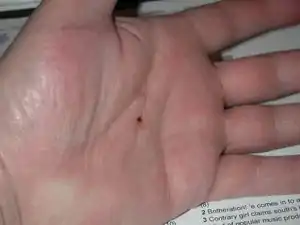Stigmata
Stigmata are the appearance of Jesus Christ's crucifixion wounds on the bodies of believers.

| Christ died for our articles about Christianity |
| Schismatics |
| Devil's in the details |
| The pearly gates |
v - t - e |
Appearance
The stigmata appear as holes, often bloody, through the palms of the hands (or, more rarely, wrists), and the soles of the feet. In some cases the stab wound, where the centurion pierced the dead Jesus's side, also appear, and sometimes cuts around the scalp and forehead, corresponding with the crown of thorns.
The first recorded stigmatic, and one of the very few cases endorsed by the Roman Catholic Church as a genuine miracle, was Francis of Assisi in the thirteenth century, who reportedly received the stigmata after a divine vision of an angel giving him the five wounds of Christ.
There have been several recorded cases in the centuries since, and many within the last century. Stigmatatics are almost invariably Roman Catholics, and often ascetics such as monks or nuns. Sometimes they have been preachers or mystics operating outside the church's approval.
According to some accounts, stigmata can exhibit some unusual, and allegedly supernatural, tendencies, such as remaining consistent for long periods, without either healing or rotting. Reportedly, sometimes they give off a sweet, perfume-like smell.
Most stigmatics suffer the physical pain associated with their wounds, although a few claim to have received them without suffering. Some, on the other hand, apparently experience the full pain of stigmata in the relevant parts of their body, with no external appearance of wounds at all. These are known as "phantom stigmata".
Suggested explanations for stigmata
They're a divine miracle

This is the classic Christian explanation of the stigmata. Stigmatics, and those who believe in them, see the stigmata as a great gift from God, despite the accompanying pain.[1] However, the inconsistent appearance of stigmata, which differ from one stigmatic to another, is difficult to account for. Stigmata most frequently appear on the palms and backs of hands, although historians now believe that crucifixion victims would be pierced through the wrist rather than the hand itself.[2] And why the hell would God's gift hurt so much?
Stigmata are self-inflicted in a deliberate attempt to deceive
Stigmatics may inflict the wounds on themselves, or otherwise fake them, in a bid for attention, acceptance or fame. This has proven to be the case in numerous examples. One remorseful sixteenth-century stigmatic confessed to faking her stigmata. Another stigmatic was caught painting fake wounds on herself.[3][4] When modern stigmatics have submitted themselves to observation from skeptics, it has often been noted that their wounds only start to bleed after times they have been alone, as if something had occurred that needed to be kept hidden from view.[2][3] Padre Pio, the twentieth century's most famous stigmatic, canonised by the catholic Church, is now widely believed to have faked his stigmata, possibly with the use of carbolic acid.
Stigmata are self-inflicted by delusional individuals
It is possible that some stigmatics may be mentally unbalanced enough to have inflicted these severe wounds on themselves while remaining unaware, or in denial, of their actions. Certainly it is notable that most of history's recorded stigmatics were also ecstatics, individuals who experienced trances and reported divine visions. Some were also known for their severe flagellation, behaviour which modern secular psychology would describe as masochism or self-harm. Individuals with these tendencies, and a morbid fascination with the iconography of the Crucifixion, could subconsciously enact their religious fantasies on themselves by creating stigmata.[4]
Stigmata are a psychosomatic condition
If a person has strong enough faith in their relationship with God, and wants to have stigmata strongly enough, their body may respond with physical symptoms. This has been proposed many times, but remains controversial. It is not a plausible explanation for open wounds, since there is no explanation for the imagination's ability to create such damage within the external body. It may be a reasonable explanation for cases of phantom stigmata, where the stigmatic feels the pain of crucifixion wounds but has no external marks. This theory's application to other cases, such as stigmatic bruising or spontaneous bleeding, remains more dubious.[2][6]
Some cases are misdiagnoses of something else
Cuts, bruises, or other marks received coincidentally in characteristic places such as the palms or feet, might easily be mistaken for stigmata by zealous Catholics. One theory proposed in 1935 asserts that St Francis's stigmata could have actually been purpura, a rare complication of malaria in which hemorrhages of blood appear symetrically on the hands and feet.[7] Some modern stigmata cases could be linked to rare medical conditions which involve unexplained bruises or spontaneous bleeding.[8]
See also
References
- See, for example, "Stigmata and Blood Sign Miracles", at Sons of Thunder
- "What's the deal with stigmata?", at The Straight Dope
- "Stigmata, easily faked", at For Skeptics
- See "Stigmata" at Apologetics Index
- "Italy's Padre Pio 'faked his stigmata with acid'", The Daily Telegraph, 24 October 2007.
- "Stigmata" at Strange and Paranormal Activity
- "St Francis' Stigmata", Time Magazine, 11 March 1935.
- "Stigmata? Nameless Condition, Mysterious Bleeding", abc News, 28 October 2008.